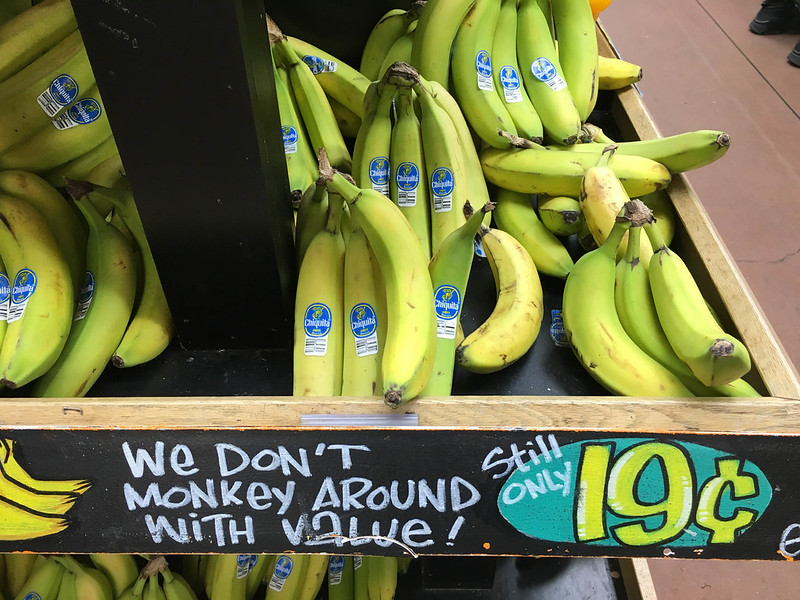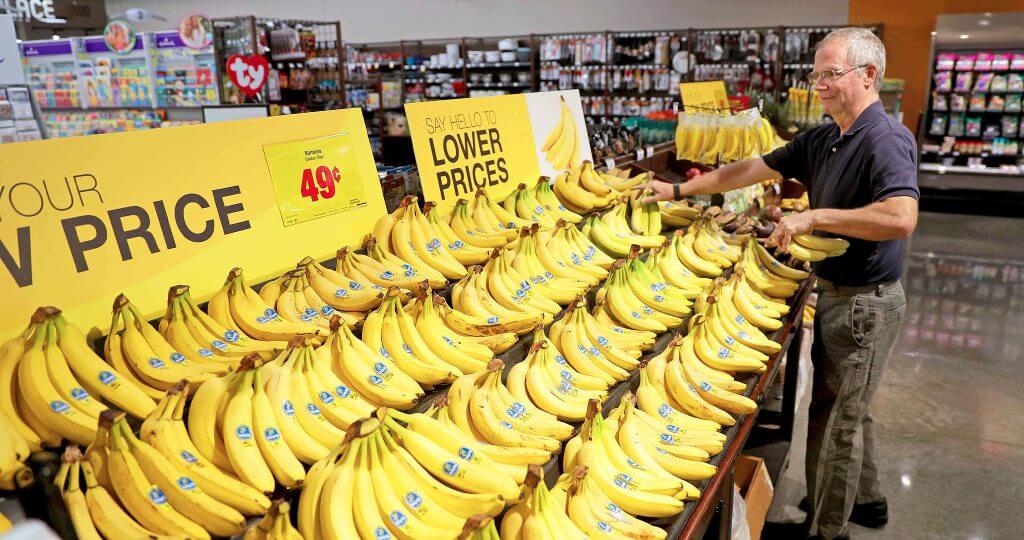Banana Link’s International Coordinator, Alistair Smith, recently wrote an op-ed on banana prices for The Grocer. A longform version of the piece is reproduced below.
“Suck it up, buttercup” is another way of saying “deal with it!”. This is the heart of the message coming from the vast majority of banana industry players at the recent World Banana Forum conference in Rome, which brought together diverse stakeholders from across the globe. In a world where fruit prices are effectively set by supermarkets at the end of the chain, it is a message that the prices they pay their suppliers must to go up, and the era of super-cheap banana prices for consumers must draw to a close. The bottom line is that consumer prices, and correspondingly the prices paid per box to banana producers, is nowhere near sustainable. Things are going to have to change. Retail buyers are going to have to deal with it.
As one North American marketing company CEO pointed out to the Forum: “Oranges and bananas were pretty much the same price per pound in 1980. Today banana retail prices in the USA have little more than doubled whilst orange prices have more than quadrupled. If banana prices had followed the same inflationary path as oranges they would be sold at $1.26 per pound (£2.18 per kilo). Instead they were at $0.61/pound in January 2024.” However, as we know, bananas in the UK are much cheaper now than when the supermarket chains went into price war mode over 20 years ago now.
“Banana prices will rise with temperatures”
This is not an appeal to the good ethics of major buyers, but can be taken as a warning that if price increases are not planned for, they will be imposed. As the BBC reported during the World Banana Forum conference, for example, experts predict that temperature rises will make banana export production unviable in many of the current origins. In the meantime, the chances are very high that rising temperatures will lead to less production and therefore higher prices.
In any case, the economics of selling bananas too cheaply makes no sense. Growers are increasingly squeezed between the demands for increasing social and environmental standards on the one hand, and prices that do not reflect the costs of sustainable production on the other. This dynamic, if allowed to continue, will eventually bring down the whole banana trade edifice. Small producers – the canary in the coalmine of the industry – are already falling by the wayside en masse. As the Caribbean calypso warned, consumers may have to read “Yes, we have no bananas!” on empty shelves.

Living wage push is forcing the issue
As European retailers organise to start counting the cost of ensuring the payment of living wages for all those working at the beginning of banana supply chains, it is finally becoming evident that prices must include the cost of filling living wage gaps, where they are identified. The implications of establishing decent work and incomes for banana workers will not only improve workers lives, and those of their families, but will have a bearing on broader global issues. As one workers’ leader from Central America stated in Rome: “Low income for planation workers is directly related to low prices per box. Mass migration to United States and Spain is provoked by the lack of economic opportunities in banana producing countries.”
In a joint statement ahead of the Forum, producers from Latin America, Africa and the Caribbean called for Fairtrade minimum prices to be established as the basis for future pricing. In Rome, a clear consensus was expressed that in order to negotiate and pay decent wages, producers need decent prices. Responsible purchasing means negotiating prices that recognise and account for the social, economic and environmental investments that producers must, and are increasingly expected to make. On the issue of covering better wages for all, it will simply not be sustainable to make contributions to bonus payments for a few years while continuing to pay unsustainably low prices.
As one multinational put it: “Price needs reassessing by retailers, and the buyers and CSR team need to be in the same room. Buyers should be incentivised on the success of living wage implementation. We can’t have the buyers and CSR teams incentivised with opposing tasks.”
So, what is the true price of bananas?
Living wages for workers is just one of the costs of sustainable production that the current pricing model does not cover. If banana production systems are to become climate and disease resilient and non-toxic to people and the environment, the industry is going to need to pay a price that allows producers to invest in trailing different varieties and production systems, such as agroecological or regenerative farming methods. Where the price paid for bananas is kept artificially low, the social and environmental debts accrue: this can look like an upturn in precarious work (increasing use of part-time or casual workers, dependence on third-party contractors, exploitation of undocumented migrant workers) a developing hostility towards workers’ right to independently organise, or harm done to the environment when land and water is left contaminated with heavy metals. The ripples continue to expand, impacting the health and wellbeing of the families and children of workers, and the communities they live in.
The only serious study on “true prices” put the real costs of bananas, including the unpaid social and ecological costs, at between 50% and 100% of what is currently paid to big conventional growers.
The African growers’ representative put it this way : “’True Price’ means includes all externalities. We need to take long-term view that can cost in decent work, climate adaptation, the development of new varieties and agroecological transitions.”
Some retailers are listening and leading the way
Following negative press on price-setting, Aldi has abandoned the tender-based system and has put in place a new approach with collaboration between buying and sustainability teams and partner consultation. This includes a long-term commitment to buying relationships. Tesco and, most recently, Sainsbury’s have also developed longer-term relationships with producers.
Aldi South’s approach to “shared responsibility” includes more frequent price updates to reflect costs of sustainable production, using changes in the Fairtrade minimum prices as a basis for decision-making. Their representative appealed to others:
“Legislation doesn’t yet cover responsible purchasing practices but we want to serve as a blueprint to other retailers and encourage them to follow this shared responsibility approach.”
The Tesco representative stated that “long term contracts are the basic element of responsible sourcing practices”. He proposed that the Forum determine a reference value for the Cost of Sustainable Production.
Alistair Smith, Banana Link’s international coordinator, also highlighted the role of supermarkets in educating consumers, who need to be prepared for higher prices for their favourite fruit:
“For too long, supermarkets in most countries have only communicated on price when talking to consumers about fresh bananas. It should simply not be possible any longer to respond to consumer demands for fair trade, living wages and sustainable farming by keeping purchasing prices as low as they are and saying nothing about all the other issues.”
